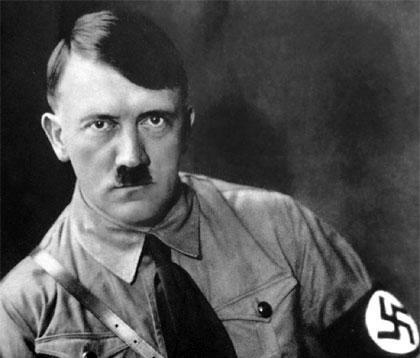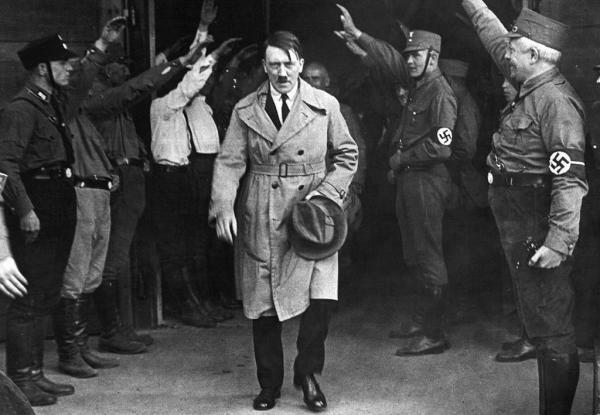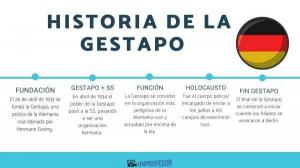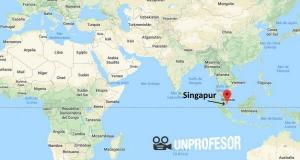Hitler's rise to power

The signing of the Treaty of Versailles by Germany meant the end of the Great War and with it the advent of a series of consequences towards the Germanic country because France branded him as the only culprit of the start of the war and of all the calamities that in it they happened. Thus Germany for several decades was suffocated with a series of measures and fines that it had to give to the affected countries after the war. In this lesson from a TEACHER we are going to see a summary of Hitler's rise to power, which was closely related to the signing of the Treaty of Versailles and the clauses set forth there.
Index
- Situation of Germany after the Treaty of Versailles
- Hitler's rise to power: the first stage
- Hitler's triumph in power
Situation of Germany after the Treaty of Versailles.
The Treaty of Versailles left for Germany a series of clauses that made the country unable to grow internally, within these we must prioritize those of the following type:
Military clause
by which Germany was devoid of military equipment (they could not create it either) and its fleet, in the same way its army would be reduced to 100,000 men and 4,000 officers (without the possibility of having heavy artillery, aviation or submarines). In the same way, the Army General Staff was dissolved and compulsory military service was eliminated.
Economic clauses
They had to deliver all the merchant ships of more than 1400 T and also had to supply with new ships annually, due to the loss of allied ships during the conflict. On the other hand, it was forced to deliver 44 million tons of coal, 371,000 head of cattle and half of the chemical and pharmaceutical production during a period of five years.
They also expropriated German private property in all territories and in the colonies (which they lost). And the payment of 132,000 million gold marks (something too excessive).
In this video of a PROFESSOR we discover the consequences of the First World War.
Hitler's rise to power: the first stage.
Having defined the guidelines that the Allies forced Germany to follow, we now have enough information to better understand Adolf Hitler's rise to power and how German society became radicalized in a deep hatred for Europe.
In 1919 Hitler joined the Deutsche Arbeiterpartei or what is the same the German Workers Party, which in 1920 came to be defined as National Socialist German Workers' Party, which became known as the Nazi party.
From the first moment we will find opposition to Marxist thoughts and they were clear enemies of the Treaty of Versailles and the government of the Weimar Republic, since they had made Germany remain in the ruin. One of the most important elements of the party would be the defense of the nationalism and from pangermanism, in addition to promoting a great antisemitism.
The great oratory that Hitler had, allowed him to attract followers from the first moment, he soon became the party's propaganda chief in the 1920s, being the one who designed the party's symbol (the swastika). Within his plans, he created an assault group "storm detachment”To control people at their rallies.
There were many people in the party who saw from the first moments how authoritarian Hitler could be, but they were also aware that they had to keep it for the party to grow and little by little they were accepting all their decisions.
In 1923 Hitler made an attempted coup, popularly known as the Munich Putsch, which ended with a five-year sentence in Landsberg prison, in which he would write his famous work, Mein kampf (My struggle). On the other hand, he dedicated himself to distorting all the allegations that were against him to make the German people see that the republic was the guilty of the state of Germany.

Hitler's triumph in power.
We continue with this summary of Hitler's rise to power speaking, now, of the conquest of success. During the following elections the party did not get the expected votes and began to march on the places where the foci of communism were higher to provoke brawls and that in this way society would know the propaganda of the match. The turning point came in 1929 when in a referendum they gave recognition to the Nazi Party.
That same year there would be the crash of 29, which further weakened the Weimar Republic and causing both the Nazi Party and the Communist Party to rise on the lists in the 1930 elections. While this was happening, Hitler would continue traveling through Germany to recruit followers, while the troops of The SA were marching through all the cities and interrupting the rallies of the other formations policies.
Given this, the centrist parties had nothing to do and there were many who decided to approach Hitler before the communists. On the part of the government of the Republic, we know that they prohibited the paramilitary clothing of the different groups that Hitler had created between the 20-30s, such as the SA or the SS in a weak attempt to stop the Party in its tracks Nazi.
On January 30, 1933, Hitler was appointed Chancellor of Germany. after a coalition between the Nazi Party and the conservative nationalist parties. Thus, this had to govern in coalition with Wilhelm Frick and Hermann Göring (although all three were Nazis). After the Reichstag fire, Hitler became much more authoritarian, demanding their vote from other political parties. for everything and eliminating the communists from the government (they were excluded from the polls, that is, they could not appear).
The culminating moment came when Adolf Hitler asked on March 24, 1933 Reichstag that a law be enabled to give him full powers "temporarily" to end instability in the country, this law allowed him to govern for four years in a state of emergency, the first thing he did was eliminate the rest of the parties, making it only possible for the Nazi party to present itself at elections.
In this way we see how Hitler rose to power after a series of goings-on and due to the situation of German society after the cruel clauses of the Treaty of Versailles. As we know after Hitler's rise to power, he would carry out a series of movements that would lead to World War II.
In this other oneHOWTO article we will show you a summary of the causes and consequences of World War II.
If you want to read more articles similar to Hitler's Rise to Power - Summary, we recommend that you enter our category of Story.



